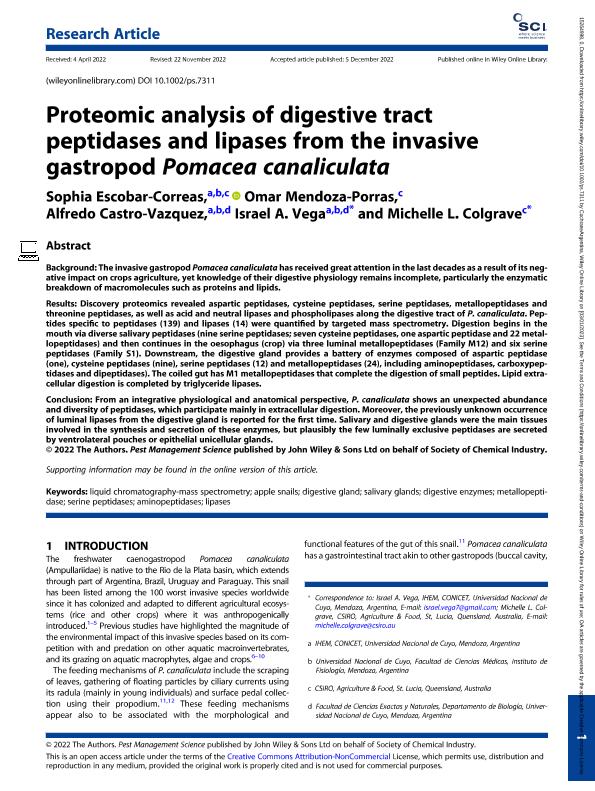Mostrar el registro sencillo del ítem
dc.contributor.author
Escobar Correas, Sophia Melanie

dc.contributor.author
Mendoza Porras, Omar
dc.contributor.author
Castro Vazquez, Alfredo Juan

dc.contributor.author
Vega, Israel Aníbal

dc.contributor.author
Colgrave, Michelle L.

dc.date.available
2023-07-26T17:28:00Z
dc.date.issued
2022-12
dc.identifier.citation
Escobar Correas, Sophia Melanie; Mendoza Porras, Omar; Castro Vazquez, Alfredo Juan; Vega, Israel Aníbal; Colgrave, Michelle L.; Proteomic analysis of digestive tract peptidases and lipases from the invasive gastropod Pomacea canaliculata; John Wiley & Sons Ltd; Pest Management Science; 79; 4; 12-2022; 1420-1430
dc.identifier.issn
1526-498X
dc.identifier.uri
http://hdl.handle.net/11336/205651
dc.description.abstract
Background: The invasive gastropod Pomacea canaliculata has received great attention in the last decades as a result of its negative impact on crops agriculture, yet knowledge of their digestive physiology remains incomplete, particularly the enzymaticbreakdown of macromolecules such as proteins and lipids.Results: Discovery proteomics revealed aspartic peptidases, cysteine peptidases, serine peptidases, metallopeptidases andthreonine peptidases, as well as acid and neutral lipases and phospholipases along the digestive tract of P. canaliculata. Peptides specific to peptidases (139) and lipases (14) were quantified by targeted mass spectrometry. Digestion begins in themouth via diverse salivary peptidases (nine serine peptidases; seven cysteine peptidases, one aspartic peptidase and 22 metallopeptidases) and then continues in the oesophagus (crop) via three luminal metallopeptidases (Family M12) and six serinepeptidases (Family S1). Downstream, the digestive gland provides a battery of enzymes composed of aspartic peptidase(one), cysteine peptidases (nine), serine peptidases (12) and metallopeptidases (24), including aminopeptidases, carboxypeptidases and dipeptidases). The coiled gut has M1 metallopeptidases that complete the digestion of small peptides. Lipid extracellular digestion is completed by triglyceride lipases.Conclusion: From an integrative physiological and anatomical perspective, P. canaliculata shows an unexpected abundanceand diversity of peptidases, which participate mainly in extracellular digestion. Moreover, the previously unknown occurrenceof luminal lipases from the digestive gland is reported for the first time. Salivary and digestive glands were the main tissuesinvolved in the synthesis and secretion of these enzymes, but plausibly the few luminally exclusive peptidases are secretedby ventrolateral pouches or epithelial unicellular glands.
dc.format
application/pdf
dc.language.iso
eng
dc.publisher
John Wiley & Sons Ltd

dc.rights
info:eu-repo/semantics/openAccess
dc.rights.uri
https://creativecommons.org/licenses/by-nc/2.5/ar/
dc.subject
AMINOPEPTIDASES
dc.subject
APPLE SNAILS
dc.subject
DIGESTIVE ENZYMES
dc.subject
DIGESTIVE GLAND
dc.subject
LIPASES
dc.subject
LIQUID CHROMATOGRAPHY-MASS SPECTROMETRY
dc.subject
METALLOPEPTIDASE
dc.subject
SALIVARY GLANDS
dc.subject
SERINE PEPTIDASES
dc.subject.classification
Otros Tópicos Biológicos

dc.subject.classification
Ciencias Biológicas

dc.subject.classification
CIENCIAS NATURALES Y EXACTAS

dc.title
Proteomic analysis of digestive tract peptidases and lipases from the invasive gastropod Pomacea canaliculata
dc.type
info:eu-repo/semantics/article
dc.type
info:ar-repo/semantics/artículo
dc.type
info:eu-repo/semantics/publishedVersion
dc.date.updated
2023-07-18T14:25:40Z
dc.journal.volume
79
dc.journal.number
4
dc.journal.pagination
1420-1430
dc.journal.pais
Reino Unido

dc.journal.ciudad
Londres
dc.description.fil
Fil: Escobar Correas, Sophia Melanie. Consejo Nacional de Investigaciones Científicas y Técnicas. Centro Científico Tecnológico Conicet - Mendoza. Instituto de Histología y Embriología de Mendoza Dr. Mario H. Burgos. Universidad Nacional de Cuyo. Facultad de Ciencias Médicas. Instituto de Histología y Embriología de Mendoza Dr. Mario H. Burgos; Argentina
dc.description.fil
Fil: Mendoza Porras, Omar. No especifíca;
dc.description.fil
Fil: Castro Vazquez, Alfredo Juan. Consejo Nacional de Investigaciones Científicas y Técnicas. Centro Científico Tecnológico Conicet - Mendoza. Instituto de Histología y Embriología de Mendoza Dr. Mario H. Burgos. Universidad Nacional de Cuyo. Facultad de Ciencias Médicas. Instituto de Histología y Embriología de Mendoza Dr. Mario H. Burgos; Argentina
dc.description.fil
Fil: Vega, Israel Aníbal. Consejo Nacional de Investigaciones Científicas y Técnicas. Centro Científico Tecnológico Conicet - Mendoza. Instituto de Histología y Embriología de Mendoza Dr. Mario H. Burgos. Universidad Nacional de Cuyo. Facultad de Ciencias Médicas. Instituto de Histología y Embriología de Mendoza Dr. Mario H. Burgos; Argentina. Universidad del Aconcagua. Facultad de Ciencias Médicas; Argentina. Universidad Nacional de Cuyo. Facultad de Ciencias Exactas y Naturales. Departamento de Biología; Argentina
dc.description.fil
Fil: Colgrave, Michelle L.. No especifíca;
dc.journal.title
Pest Management Science

dc.relation.alternativeid
info:eu-repo/semantics/altIdentifier/url/https://onlinelibrary.wiley.com/doi/10.1002/ps.7311
dc.relation.alternativeid
info:eu-repo/semantics/altIdentifier/doi/http://dx.doi.org/10.1002/ps.7311
Archivos asociados
